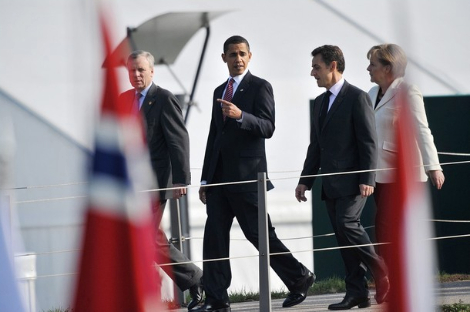NATO Struggles to find Unity of Purpose

US President Barack Obama’s debut NATO summit at the Franco-German border on April 3-4 was a triumph of style over substance. Although allies put on a public face of unity, they were unable to agree on any of the major problems facing transatlantic security. As NATO marks its 60th birthday, the Alliance is mired in a profound identity crisis and there is little to celebrate.
The summit was dominated by the problem of Afghanistan and what to do about it. European allies heaped praise on Obama’s new Afghan strategy, which sets benchmarks for progress in fighting Al Qaeda and the Taliban in Afghanistan and in Pakistan. The new plan also imposes conditions on the Afghans and Pakistanis in order to prod them to take more responsibility for quelling the insurgency and building lasting political institutions.
Obama’s new strategy also calls for the deployment of 4,000 more American troops to train Afghan security forces. These would be in addition to the 17,000 extra combat troops that Obama ordered to Afghanistan shortly after he took office.
American allies, however, pledged only modest new troop contributions for Afghanistan: They agreed to send another 5,000 troops, but only on a temporary basis. An estimated 3,000 troops will be deployed to provide security for the Afghan presidential election scheduled for August. The rest of the troops are non-combat trainers. In practice, however, the number of new European troops actually deployed will be lower because some of the “new” offers, such as those from Germany and Italy, have been “recycled” from previous announcements.
Obama put a brave face on the paltry results by saying they were a “strong down payment on the future of our mission in Afghanistan and the future of NATO.” But
by providing only modest assistance in comparison to Obama’s 21,000-troop surge, NATO as an alliance has essentially failed in Afghanistan. Indeed, the mission in Afghanistan is becoming increasingly Americanized. By the end of 2009, nearly two-thirds of the estimated 95,000 permanent foreign military personnel in Afghanistan will be American.
Transatlantic differences over the mission in Afghanistan mirror the larger debate over the future role of NATO itself. The United States is seeking greater mutual responsibility, not only in Afghanistan, but on a wide range of security threats in the post-9/11 world. Many European allies, on the other hand, are reluctant to turn NATO into a global policeman, not least of all because that could compromise their ambitions for a European Security and Defense Policy (ESDP) that is independent of American influence.
Obama tried to reassure Europeans by saying: “I didn’t come bearing grand designs – I’m here to listen, to share ideas and, jointly as one of many NATO allies, to help shape our vision for the future,” he said. “If NATO becomes everything, then it’s nothing,” he said.
On the other hand, Obama said contributions to the NATO mission in Afghanistan should be dictated by military and not political needs, and reminded allies that Al Qaeda poses an even greater threat to Europe than it does to America. “I think it is important for Europe to understand that even though George Bush is no longer president, Al Qaeda is still a threat. We cannot pretend that because Barrack Hussein Obama got elected as president, everything is going to be okay.”
The quandary over defining the future role of NATO also colors the debate over whether or not Georgia and Ukraine should become members of the Alliance. Although the United States and several Central European countries are generally in favor of bringing those countries into NATO, Germany, France, and several other Western European countries are more wary. They are reluctant to antagonize Russia, which supplies them with oil and gas and views NATO enlargement as a threat. For example, Russia has warned that it will target nuclear missiles at Ukraine if it joins NATO.
At the NATO Summit, Alliance members papered over their differences by keeping the door open for Georgia and Ukraine, while at the same time announcing plans to improve NATO-Russia relations, which were badly damaged after the Russian invasion of Georgia in 2008.
Even if Allies agreed to disagree on nearly all of the pressing issues of the day, the NATO Summit did produce at least a few clear successes. They welcomed Albania, Croatia and France as full partners, bringing the total number of NATO members to 28. And they unanimously agreed that the pro-American and pro-European Danish Prime Minister, Anders Fogh Rasmussen, is the right person to navigate NATO into the future.
What remains to be seen is whether and how the unity of surface on display at the summit can translate into unity of purpose for the strategic challenges ahead.
Published by World Politics Review on April 6, 2009
Soeren Kern is Senior Fellow for Transatlantic Relations at the Madrid-based Grupo de Estudios Estratégicos / Strategic Studies Group



